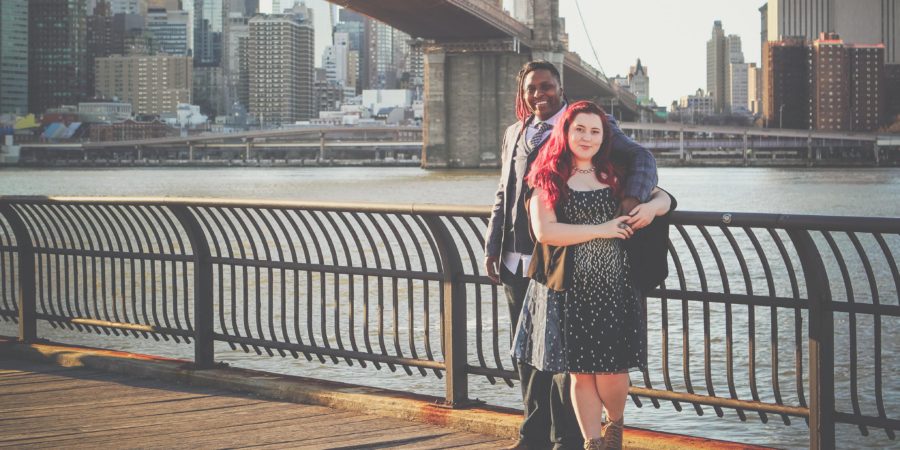When Rocky Lane considered transitioning from being assigned female at birth to male, he had a lot of concerns. One was his age, and another was if he would ever find a partner that fully accepted him for who he was. He doubted he would ever actually transition. Then, in March 2014, he connected with Sarah Swofford, a queer cisgender woman, on OKcupid.
After seeing they had a few close mutual friends in common, they agreed to go on a date. The two hit it off and became a couple. While Sarah had never dated a transgender person, when Rocky came out to her as trans, she welcomed him with open arms and became a huge source of encouragement. With Sarah’s support and help, Rocky began coming out that same year and started to officially transition. The couple married in November 2015, and Rocky has been on hormone therapy for the past 16 months. He’s getting top surgery in June.
Sarah, now 30, and Rocky, now 35, currently live in Austin, Texas, where Rocky is a massage therapist and Sarah is a hair and wardrobe stylist. They recently started SwirlBabyTV, a YouTube channel about their life as an interracial trans-cis couple since there is very little representation of this type of relationship out there in the world. The couple is also working on a crowdfunding campaign to fund Rocky’s top surgery.
This is Rocky and Sarah’s story of enduring the highs and lows of transition together, the challenges of an interracial relationship, being a trans person of color, and creating a platform to promote visibility and help people going through a similar journey.
Profiles in Pride: Rocky, when did you realize you were transgender, and when did you start transitioning?
Rocky: I’d say I’d known I was transgender for a really long time. My earliest recollection was maybe around kindergarten. I wasn’t sure, I was just very gender diverse, so I was really more of what would be classified as a butch or masculine woman for most of my life. I came out officially at 19 as a lesbian.
Then as trans, I started coming out socially when Sarah and I got together in 2014; that’s when I came out to the world. Probably a couple years before that, maybe 2012, was the first time that I realized that I fit in the category.
PIP: Was meeting Sarah part of what helped motivate you to start transitioning?
Rocky: Yeah, I wasn’t sure if I wanted to transition when we got together because of my age and other things, but Sarah definitely helped me understand the process of what that looked like a little bit better. I only had a few friends who were transitioning, but she was the one who got me the books, helped me get a therapist, and all that stuff that’s hard to keep track of by yourself. She gave me the right little bits of resources to figure it out.
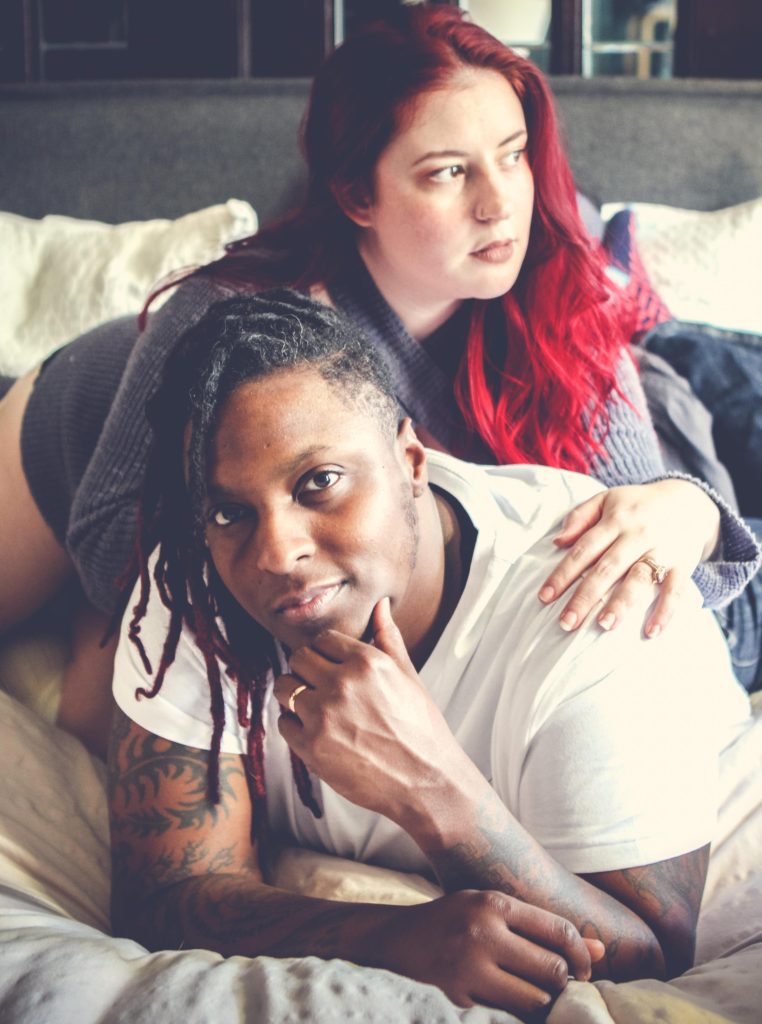
PIP: What has your transition been like for you so far?
Rocky: So far, it’s been really encouraging. A lot of the things that were giving me the most trouble or worry, like the size of my chest and some menstrual-related things, disappeared very quickly. That actually helped me feel a little less dysphoric, which was nice. My energy is great.
Also just my ability to be touched and intimate is much better. That was a big source of concern for me in finding love and having a good intimate relationship and partnership. Working through that while on T has been a lot easier, so I’d say it’s been a good ride so far.
PIP: Sarah, how did you first come into your identity as a queer person?
Sarah: I think as far as coming out to people, that was something that didn’t happen until I was around 23 or 24; that’s when I started actually verbalizing that I thought I was queer. I realized through dating and some relationships that I didn’t necessary find myself fitting into a box of straight or gay, or even bisexual, or even newer definitions — a lot of people identify as pansexual. I think that’s so great if you identify like that, but for whatever reason, those labels just never really fit me.
So I think in my early to mid 20s, I started spending time with people who had a lot broader definitions of what it means to be a queer person, and I realized that fits me, that’s who I am, that’s what I am. For me, relationships, and especially romantic relationships, are a lot about the person you find, and a lot less about how they define themselves.
PIP: Absolutely. When I grew up, queer was considered such a bad word, and it’s really only in the last year I’ve been more comfortable using it; I do love the broadness and vagueness of it.
Sarah: Yes, I like this newer adaptation or definition of queer and what it means to be queer, and how queer can kind of be this blurry gray area where a lot of us live.
I think for me, I feel lucky because I grew up around a lot of people in the LGBTQ community who used the word and meant it in an empowering sense. I grew up doing theater, so from the age of like 10 or 11 years old, even though I had a very sheltered kind of religious upbringing in a lot of ways, I also had this time where I had a lot of people saying the word queer.
But I did have a similar experience as you, where it wasn’t necessarily that I had a negative connotation with the word, but for a long time I didn’t feel like could say I was queer, because to me, queer meant something more like gay, or lesbian, or bi. Again, that’s great, but I felt like I didn’t want to take that away from friends and family who are gay, lesbian, or bisexual. I don’t want to take anything away from them, so maybe I shouldn’t say I’m really queer, because I don’t really know. For a while, it was like, “I guess I’m bisexual,” since I’d dated a lot of cis men and some cis women. Finally, I decided calling myself queer was OK. I had wonderful and mentoring people in my life who were like, “You can just say queer!” I was like, “Yay!”
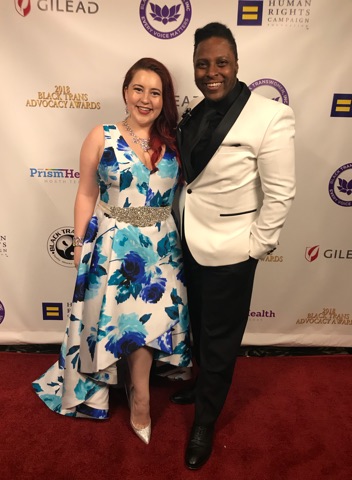
PIP: That’s awesome. I sometimes call myself queer now, in part because my partner is transgender, and the word “bisexual” started to feel too binary and limiting. Though I did have a very PC person once suggest that I should still consider myself bisexual so I would affirm my partner’s binary identity as a female.
Sarah: That’s a valid point and perspective, but I personally would disagree with that, just because I think your sexuality is a very separate thing from your beautiful partner’s gender and affirming her gender. I think it’s completely possible for you to affirm and uplift your partner in her gender. Rocky very much identifies as a male and has for the entire time we’ve been together, and I try to constantly affirm his gender and support that.
But I don’t take anything away from him by being a queer person. You’re with a woman right now, and you are in a committed relationship with a woman, and that’s wonderful, I’m in a committed relationship with a man. We can still be queer, just like you can be a gay person and in a committed relationship with the opposite sex! That’s my perspective.
PIP: Absolutely. So Sarah, what has it been like for you being the partner of a transitioning person?
Sarah: I will say first of all, it’s been really exciting and fun. It’s definitely been scary at times; I’ve been worried about things like his blood levels or making sure that one level or another is good. I get really nervous about that stuff, probably more so than he does. I want to make sure everything is going well.
There are the hard times, but for the most part, I feel so privileged to be able to witness Rocky going through this process. I feel so excited to be able to be a part of it. As selfish as this might sound, I feel like his transition has helped me learn more about myself. I think being able to be a partner of someone who’s transitioning, you learn so much about them and you learn with them, and you also learn so much about yourself. I think the way it’s made us come together in so many unexpected ways.
There are the more obvious ways, like going to go to the doctor appointments together. Then there are the less obvious ways, the little victories, like when we’ll go somewhere for the first time, like a restaurant, and instead of saying, “Hi ladies,” they ask, “Sir, would you like a table with your wife?” And he says, “YES, I WOULD!”
Things like that are really, really wonderful. It’s really fun to go on this journey with somebody. But yes, of course, there’s also the other side of it; there is a lot of serious stuff that goes on. There are a lot of serious conversations; we have to constantly come out to people over and over again. We have to constantly plan ahead and think about a lot of financial stuff, like getting surgeries and making sure that the medical needs are covered and things like that. It’s a lot of work. But right now at the stage of life we’re in, we see a lot of people having children and making that big life move. For us, this is like our baby right now, and it feels really fun exciting. Rocky wanted to do it, and I wanted to do it. Not that it depended on me, but it’s been very wonderful to be a part of it.
PIP: That’s amazing. Now tell me about SwirlBabyTV! Why did you two start it?
Rocky: Sarah and I both come from pretty different but similar backgrounds in that she has a lot of film and entertaining and stage acting experience, and I have a lot of music and performance experience. So we started trying to figure out all the different services we were individually providing before we got together, as well as some of the interest that we’ve been seeing just on random things about our courtship through my transition. A lot of people seem to like that we found each other. I think it’s cool too.
We like sharing that because we wanted to talk a little more about the normalcy of a person transitioning. Also, if the 16-year-old me could have gotten on the Internet and seen an example of our relationship today, I think that that young me would have been more hopeful about the fact that there is a relationship that exists that fits who I am truly, and I don’t have to hide any parts of me or try to be a better lesbian or something that I’m not. That was a really hard thing trying to grow up and figuring yourself out as a gender-diverse person. We follow a lot of couples online now, and seeing them makes us feel hopeful because a lot of them have gone through several years of this and they’re still really healthy and happy. Watching them move on to cool parts of their lives, like having babies, has really helped us.
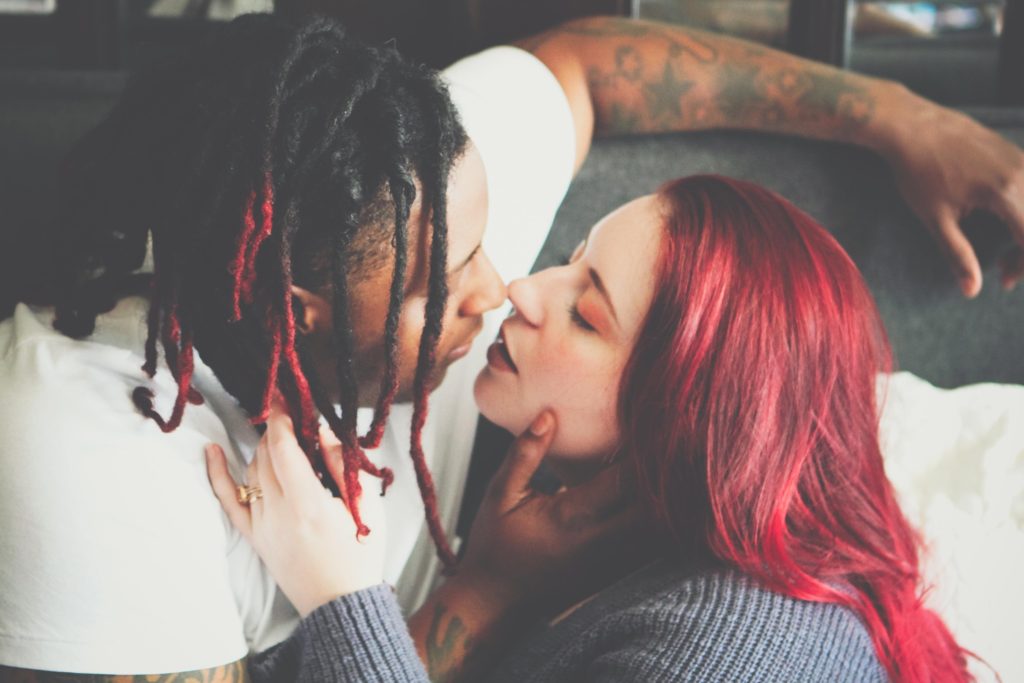
We thought, especially since I’m black and we have lots of different swirling going on, if we showed how weird and unique we are, yet how normal our relationship is, it might give somebody else like us a little bit of hope and create a conversation and bring more people like us to us. Because there is no one way to be in a trans relationship or cis relationship. I think representation in this way really matters.
We just got back from a conference called BTAC, or Black Trans Advocacy Conference, and they talked about how you just don’t see versions yourself as a black trans person in anything, really. So we’re in this place where we have to be showing it and making those windows for people to see, because we’re the only ones doing it right now. Even though there’s a lot of talk about this journey, there’s not a lot of black people talking about it, especially about interracial relationships. We wanted to add all this extra stuff, like our relationship and what other things we do and what other talents we have, and how we really bring out those talents in each other. So we thought we’d try to capture some of that in some of these videos and see what happens.
Sarah: And talk about the unique challenges as an interracial couple and as a cis and trans couple queer and straight — we’re so many things!
Rocky: Some people are lost out there because we only have a cis representation in media. It’s really tough to find your perfect partner. There are a lot of people who won’t admit they are having trouble understanding what they need to be happy in certain areas of a relationship, and I think it keeps them from love. Like if you’re a trans man who likes certain aspects of sexual play over others (i.e penetration). Being able to talk openly about preferences and how it has nothing to do with who you are in a relationship with and it doesn’t diminish your masculinity or that you are being “difficult to have sex with” or anything. There just aren’t people talking about this kind of stuff.
For me, talking about not wanting to be touched in certain places really killed the mood in my previous relationships, but it wasn’t an issue with me and Sarah. That connection is possible if you know how to navigate the conversation. I almost gave up on trying to find someone because it was so difficult and uncomfortable. SwirlBaby was just for that little bit of connection with others who may have questions about how we make it all work together.
PIP: Rocky, can you talk about your experience being in an interracial relationship and being a trans person of color?
Rocky: There’s an element to being black and trans that’s a part of the narrative but doesn’t get talked about a lot, because it can cause people to lose more and more support if they speak publicly about it, but I think it’s important to talk about.
Like the relationship between your partner and your family, and yourself and your family. I’ve struggled with who I am, my identity, and my family’s perception of it for a number of reasons, which I think are caused by the deeply-held conservative religious beliefs of many Southern black families. These religious and racial stressors to family relationships can be really harmful to us emotionally and to me personally as a proud black man.
Much of my family doesn’t recognize my masculinity, and sometimes my community has a hard time even recognizing me as fully black. It comes from a lot of things; it comes from the way I speak, and from the other side of my family history, which is coming from mixed-race family — I have one grandma who is white and one grandma who is black. So I kind of got pushed out of a lot of different safe zones very early. We mentioned BTAC; it’s a conference they have every year. This was our first year attending. We found a really beautiful family there, because usually I don’t have a lot of black friends, specifically because of who I date.
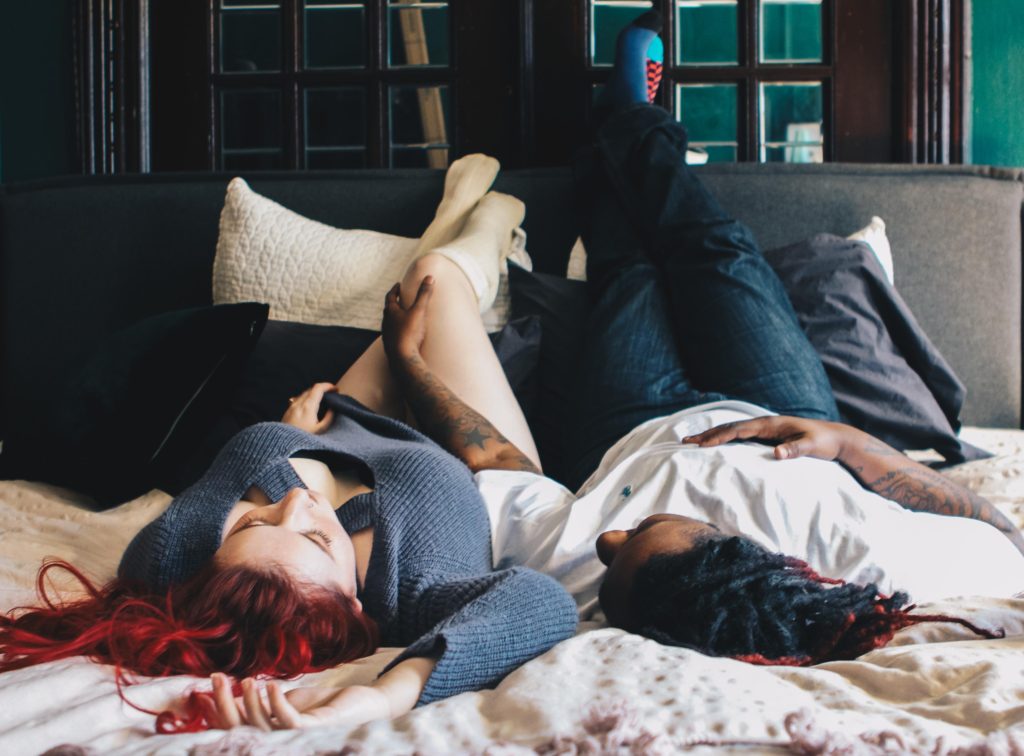
Sarah’s family lives in a very conservative part of the country as well, and her introducing me to them, that kind of underlying racial divide really showed its ugly head on both sides, in both cultures. We have had to deal with that, and I’ve had to deal with that as I’ve only dated outside of my race my entire life. I’ve taken the same hit every time I’m introduced, unless I’m kept secret. If I’m not a secret and I’m introduced to families, there’s a huge sacrifice that has to be made on behalf of my partner. Sometimes my family will accept them, and we’re very lucky that my family and her family have slowly grown to really love and support us to a certain degree. Some of our family didn’t come to our wedding. That’s hurtful and those divides are hurtful. They know that and we know that, and we’ve worked through it, but nobody talks about it.
I think it’s very important that I start giving a little more information on that, because it is hard and I don’t think it’s right. Me being black, the only thing that’s a struggle for us right now is the safety aspect. That people of color in our community are killed at a disproportionate rate. That’s a very real danger we have to worry about. We drive to most places instead of walking for safety. It’s a very real concern in our minds every single day. I have some experience in the past, but not anything right now that makes me feel fearful for my life, but sometimes we worry about sharing our story too much, because we do worry about becoming targets. That’s also a barrier to getting stories like these out.
So it’s a big step forward to be able to do things like the Internet and things like this, your profile, because some people don’t want to talk about it and they go into what they call “stealth mode.” But there’s a huge contingent and huge community of people out there ready to support families like Sarah and I, and there’s an even bigger community of people in the larger LGBTQ+ community that will support you.
But I’ve heard a lot of people say they don’t find the support for those reasons. It’s a really tough thing that I don’t have my head entirely wrapped around yet, but the more I visually become who I am to everyone else, I’m noticing things that are warning signs, like you’re entering a point of no return. Are you sure you want to do this? And I’m like, hell yeah, this is just who I am. But the danger is very real.
PIP: Thank you for sharing that. Sarah, what has your experience been?
Sarah: There are times when I don’t know how to be the most supportive. My job right now is to amplify my husband’s voice and support him and be his wingwoman and his backup. I can’t identify with that experience; I have so much privilege. Even though it can be scary for me to talk about us and certain things, there’s still a big difference in the privilege that I get going out in the world and telling our story, versus if Rocky goes out in the world and tells our story. People can look at me and not even know that I’m queer. While that can be annoying, it can also be considered a very high privilege. People aren’t going to look at Rocky and think that he’s not black.
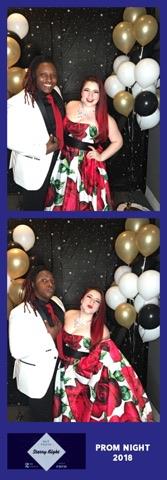
PIP: Absolutely. Personally speaking, as a white person, I think it can also be tricky to figure out how to use that privilege to be the best ally.
Sarah: Exactly. That was one of my big fears about going to BTAC, because it’s a conference focused for black trans people and their partners and spouses and allies, but their main goal is to serve the black trans community. I was nervous, because I’m a see-through white person, I’m like a ghost human! And I’m walking into this space, and I’m just the whitest bitch ever! I totally understand why everyone would hate me. How am I going to be a support and how am I going to be an ally?
And I will say, it’s so not their job to educate me and tell me how to be an ally, but they totally did. People embraced me fully, they didn’t look twice, they didn’t do a double take, they weren’t like, “Why are they here?” That community just blew me out of the water. Like Rocky and I said, at first we did not have the best experiences with some of each other’s family. So we were both scared as an interracial couple going into this environment, but it was incredible. I can’t even begin to describe it.
PIP: Is there anything else you’d like to share?
Sarah: We really appreciate the opportunity to talk to you, both to meet other people like us and share our story. But also, what you’re doing is so important. Visibility is so important. It’s beautiful and wonderful and it’s done with such respect and dignity. That’s one thing we’ve been talking about, especially as we’ve met elders in the trans community, is that it’s so important to approach any person, in any story, with dignity and respect.
All professional photos in this post were taken by Sarah Shalene Guilbeaux, a queer photographer we profiled in December. Make sure to read her profile, too!

